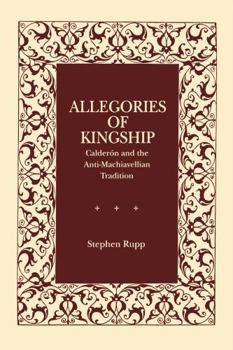Allegories of Kingship: Calderón and the Anti-Machiavellian Tradition
(Part of the Studies in Romance Literatures Series)
Select Format
Select Condition 
Book Overview
This study examines issues in politics and political theory in selected works of Pedro Calder?n de la Barca (1600-1681), the major dramatist of the middle and later decades of the seventeenth century in Spain. By analyzing secular dramas (comedias) and religious plays (autos sacramentales), Stephen Rupp demonstrates Calder?n's awareness of the ideas and institutions of power in Hapsburg Spain and explores the terms of his intervention in the long debate over the principles of Christian statecraft. Through references to Rivadeneira, Saavedra Fajardo, and Quevedo, Rupp describes the anti-Machiavellian theory of kingship that informs Calder?n's political theater. Rupp's argument proceeds from abstract principles of political theory to particular institutions and events at the Hapsburg court. Discussion of two comedias (La vida es sue?o and La cisma de Inglaterra) and five autos (La vida es sue?o, A Dios por raz?n de Estado, El maestrazgo del Tois?n, El nuevo palacio del Retiro, and El lirio y la azucena) demonstrates Calder?n's assimilation of true reason of state to providence, his attitudes concerning the conciliar system and the regime of the royal favorite or valido, and his allegorical treatment of significant state occasions.
Format:Paperback
Language:English
ISBN:0271026677
ISBN13:9780271026671
Release Date:September 1995
Publisher:Penn State University Press
Length:200 Pages
Weight:0.66 lbs.
Dimensions:0.5" x 6.0" x 9.0"
Customer Reviews
0 rating





